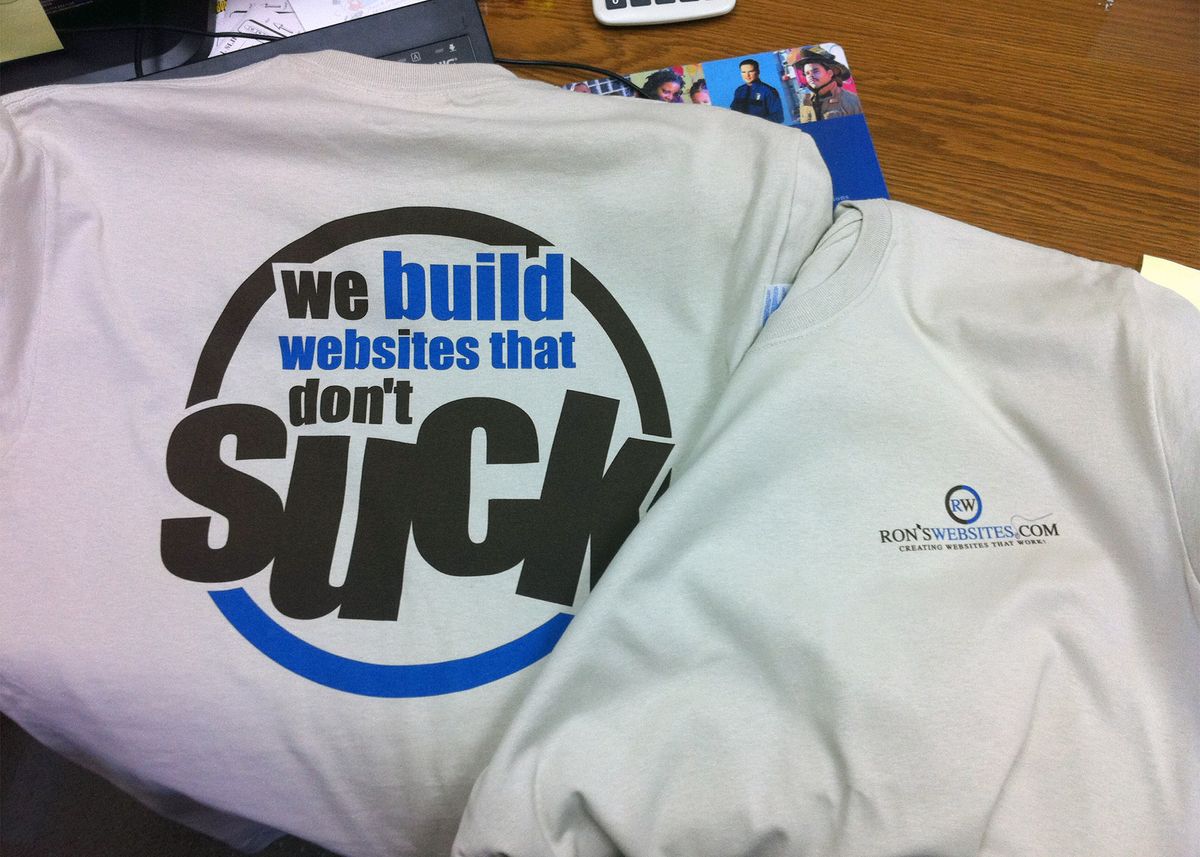Seven Steps To Starting A Business ASAP
- Pick A Company Name
- File The Legal Paperwork To Create A Company
- Get a Federal Tax ID From the IRS (EIN)
- Open A Business Bank Account
- Pick A Website Domain Name
- Create A Working Business Model
- Answer "The Money Question"
A few weeks ago, one of my brothers decided to quit his job and start his own business. He had dabbled with a few various hobbies over the years and had sold a few hand-made products on the side, but had never actually taken self-employment seriously as a full-time option. So he contacted me and asked me what it would take to start up a new business.
I started my business so long ago, and have had so many different iterations of it over the years that I had almost forgotten all the steps so it took me a while but I ended up sending him a list of steps to try to make it all as easy as possible. That got me to thinking... that's actually a really good question. What does it take to start a business, from absolutely nothing all the way to being able to take on your first client? So, here goes: here's my list of what to do in order to go from having never worked for yourself at all to being able to call yourself a legitimate business owner.
Step #1: Pick A Company Name
If you can, pick a really strong name that is specific enough that it tells people what you do but broad enough that you don't paint yourself into a corner.
For example: "Apple, Inc." only makes sense now because everybody on earth has already heard of Apple and knows what they do. But when the company was first started, it was called "Apple Computer, Inc.," and that was good. That makes far more sense, especially for people who've never heard of you. You want people to know what your business does just by hearing the name.
When I first debated what to call my first company, I came up with about 200 possible names, and ended up choosing "4x5 photo and design." Why? Because I was into medium-format 4" by 5" photography at the time, and I wanted to be a photographer and graphic designer. So I found something catchy for the first part ("4x5") but also made sure I listed what I actually did (or at least planned on doing). So the "photo and design" served to tell people what they could hire me for.
Step #2: File The Legal Paperwork To Create A Company
There are lots of ways to do this. The easiest is to create a "sole proprietorship," which you use all your own information for, including your own name, and your own social security number. Don't do this.
Create a real business. In the USA, the best, easiest, and cheapest way is to create a limited liability company (LLC). The fancy term for this is a "disregarded entity." You don't need to know what that means, just know that you're trying to create separatation from yourself so that you have a business that stands apart from you for legal and financial reasons.
Find out who your Secretary of State is in your state, then fill out the paperwork to file "articles of organization" as an LLC. Depending on the state, it can cost anywhere from $10-100 or more. Make sure you fill out the application perfectly, crossing all the Ts and dotting all the Is properly. Otherwise, you'll have to file an amendment, like I did when I first filed my paperwork due to a mistake, and I had to pay twice. Don't let that happen to you.
Make sure you put the words "limited liability company" or "LLC" somewhere in the name. This is very important. For example, "Acme Birdseed" is not good enough. "Acme Birdseed, LLC" is.
Step #3: Get a Federal Tax ID From the IRS (EIN)
Getting a tax identifier will help you keep your business (your taxable entity) separate from your own personal taxes. You'll want to get an EIN (employer identification number) from the IRS for this. (Note: this is also sometimes calles an FEIN (federal employer identification number).
I know this might sound weird if you aren't planning on hiring anybody, but the IRS will still consider you an "employer" even if you have no employees. Good news by the way: getting an EIN is free.
Your EIN will have nine digits, just like your social security number (SSN), but unliked a social security number, which is formatted like 123-45-6789, an EIN looks like 12-3456789. Keep your paperwork for this, and save that EIN number foever. It is very important, and you'll need it many times in the future for banking and taxes.

Fill out this application for an EIN with the IRS
Step #4: Open A Business Bank Account
Once you have your LLC paperwork, and your brand-spanking-new EIN from the IRS, go to a bank (or even better, a credit union) and open a business checking account. Get a checkbook and a company debit card. Just do it. Even if you think you'll never write any checks, do it anyway: you'll want at least a few checks (the smallest amount is fine) for random expenses you'll discover you have where you have to write a check.
Do everything you can to keep all your business purchases completely separate from your personal finances. Keep all your receipts and track every dollar you spend and earn. You can start out using Google Sheets or Microsoft Excel for generating invoices and keeping track of finances to start, but you'll eventually grow into needing Quickbooks. At some point, you'll want a bookkeeper, but for now, track all that stuff yourself. You want to get good at understanding how money works.
One thing that is REALLY important to know is that you CANNOT mix your business and personal finances. Meaning, you can not/should not deposit business checks into your personal account or write checks to cover business purchases from your personal account. This is a completely avoidable, sloppy, lazy way to run a business and having bad habits like this are a sure-fire way to eventually getting audited by the IRS or being accused of a crime. Just don't do it.
Repeat the famous quote from the Godfather with me: "it's not personal, it's just business." This applies to your business finances as well.
Important Note on Sales Taxes: if you are starting a business that sells actual products (books, parts, physical goods, etc.) you'll have to get a sales tax license. If sell products you can touch and feel, you have to charge sales tax. If you only provide services, you do not need a sales tax license.
I've had a sales tax license in the past, and let me tell you, it's a total pain in the butt to keep unless your primary business is selling physical goods. In my case, I decided to just retire it and tell people I can't sell them products. The bookeeping is much easier and I don't have to worry about obnoxious things like quarterly reports.
In your case, it may or may not make sense to get a sales tax license. It totally depends on your business model. If you are starting a brick-and-mortar store like a coffee shop, you have no choice. You have to get one. So find out what your city requires. You'll likely have to collect sales tax for your city, your county, and your state. Contact your local government to find out how and where to do this.
Step #5: Pick A Website Domain Name
Even if you don't have a website now, or won't have one soon, or never plan on having a website, you'll want to get a domain name. This is important because you'll want to use that domain for your email.
For example, bob@smithwelding.com is awesome. It's strong, it's professional, and it tells people that your name is bob and that you work at a company called "Smith Welding." That's great.
On the other hand, skaterdude43@hotmail.com is awful. It doesn't really tell me at all what you do, or where you work, the random numbers make me wonder what on earth "43" means, and hotmail is a crazy, old, lame free service that is not professional in any sense. Don't do that.
You want people to be able to know who you are and what you do just by sharing your email address with them over the phone or when they look at a business card. Find a domain one that's available, that ideally ends in a ".com" since you're a business. My favorite domain registrar is NameCheap (affiliate link). Most domains are less than $20/year to register, so it's money well spent.
Register your domain name here
Step #6: Create A Working Business Model
The MOST important question, I think, is figuring out what your business will do and how you'll do it. Are you going to create things to sell or provide a service? Will people buy products you make, or will they pay you for your time and skills via services you provide them? Map it all out on paper, and rehash it a few times, including decisions like:
- Who: who are your clients, what do they do, where do they live, how will they find you, and what do they want from you?
- What: what you are (and are not) willing to do
- When: are you open 24/7, 365? Or do you have specific times and dates you're open for business and times and dates you're closed?
- Where: what is your service area? Where are you willing (and not willing) to work?
- How: how will you actually perform the work you do, and how much will you'll charge your clients?
The more specific the better, but you won't be married to your answers and you can tweak them over time. For example, when I first started my company, I was going graphic design and photography. These days, I do websites, digital marketing, and search engine optimization. I don't offer graphic design or photography at all, and I've modified my billing structure probably five or six times. That's okay. Again, it's okay to change it later if needed but you have to pick something to start.
Step #7: Answer "The Money Question"
Finally, here's the single most important task you have before you: finding out exactly what you need to do in order to get at least one paying client or one product sold. When I have mentoring sessions at startups, I always ask company founders the same question: "How fast can you get to your first dollar?"
Many, many times, I've seen people who come up with brilliant plans, ingenious spreadsheets with break-even financial models and pro-forma projections on future revenue, SWOT analyses, and all kinds of fancy calcuations about their fictional company that many never even see the light of day. I try to cut through all of that hype because, until you actually make money, it's all fake. None of it is real. All that matters is can you actually make money? People are often so obsessed with getting the details perfect that that postpone making money. So I'll push and say "What can you do to get that first dollar? What can you do to get one paying client today? Or if not today, how about by this Friday?"
How quickly can you make that first dollar? Will it take you three months, or can you find a way to get cash in your pocket by the end of this week? If you can, figure out the fastest way to deposit that very first check. Then work backward from there, and think about all the steps needed to do that. Then take those steps. It's really that simple.
Once you get one client or one sale, you're good. Then just repeat the cycle to do the same thing again, then again, and again. Then, maybe fifteen years later, you'll look back and think, "Wow, how did I get here, with this business and all these clients and all this wonderful, consistent income?" and you'll realize the secret was just starting with one client and then repeating. Or at least that's how it worked for me.
I hope you found this helpful.




Member discussion: